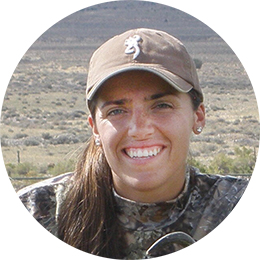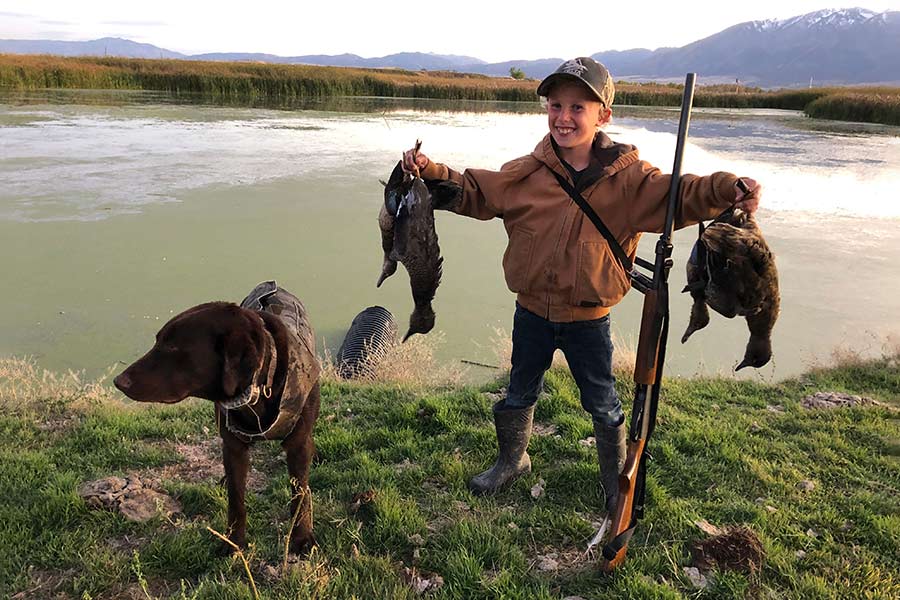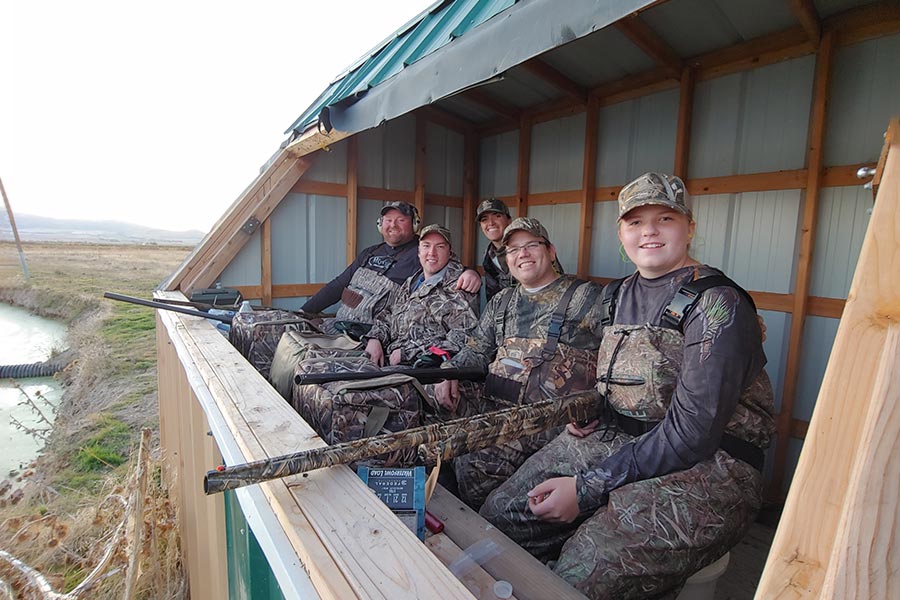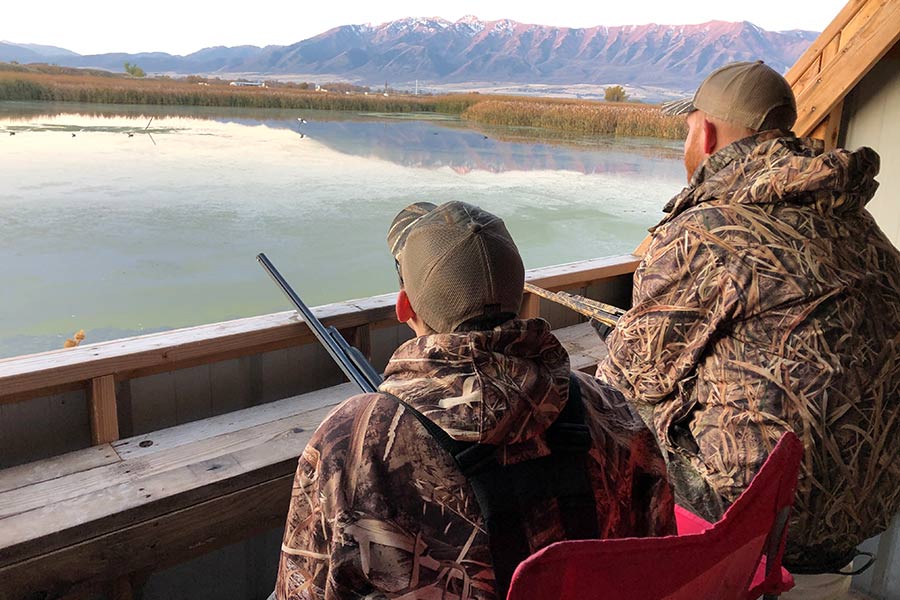Interview with a first-time duck hunter
The mentored trip was a successful, unforgettable experience
By Rachael Tuckett
DWR wildlife recreation specialist / Walk-in Access coordinator
As a kid, I was not the typical girl who got excited about manicures and pedicures with mom. Instead, I'd spend all evening packing hunting and fishing gear so my dad and I could get outdoors the next morning. My childhood memories are filled with hunting trips, early mornings at a lake or reservoir, and shooting competitions.
When it was time to apply for college — and I learned I could turn my passion for hunting, fishing and shooting sports into a career — I was all for it. I graduated from Utah State University with a bachelor's degree in wildlife biology.
I'm currently a wildlife recreation specialist for the Utah Division of Wildlife Resources in northern Utah. As part of my job, I get to introduce people to hunting, fishing and shooting sports events for the first time.
I was fortunate enough to have a dad who introduced me to hunting as a little girl. I will be forever grateful to him and will cherish the memories we continue to share in the field. Being able to pass that on — by sharing my passion for hunting and the outdoors with new hunters and anglers — has been an amazing experience.
It's exciting to see them get interested and energized about things they've never tried before. Thanks to awesome partners, including Utah State Parks, conservation groups, sporting goods stores, and avid individual hunters, anglers and target shooters who want to help us out, we've offered some wonderful events.
Mentored duck hunting
This past fall, I worked with the Cache Valley chapter of Delta Waterfowl to take eight people on their first duck hunt. None of the hunters had ever hunted ducks, and some of them had never hunted anything before.
Three youth and five adult hunters participated in the hunts, which were held in Cache Valley. Tom Tyler was one of those hunters.
I first met Tom at a waterfowl seminar and at a field dressing/game processing clinic I helped organize. I was very impressed with him and his excitement to learn as much as he could at the events. He even remained after the events to ask additional questions and get contacts within the DWR who could give him more information.
My experience with Tom and the other hunters at the mentored hunts has been the most rewarding thing so far in my career. Being able to see new hunters harvest their first duck was incredible!
I recently interviewed Tom about hunting and his mentored duck hunt experience. Here's what he had to say:
Q1: You recently went on a mentored duck hunt. Was this your first hunting trip? If so, what made you want to give it a try?
A1: I started hunting this past year. I tried hunting white-tailed ptarmigan, grouse and rabbit, but I was unsuccessful with all of them. So, this wasn't my first-ever hunting trip, but it was my first duck hunting trip. It was also my first hunting trip with a mentor or someone with previous experience. I've always been interested in hunting, but I have had a hard time knowing where and how to start.
Back in 2018, I was involved in an auto accident where I broke bones in my legs, hips, pelvis and wrist. While I was recovering and couldn't walk, I watched the show Meat Eater, which got me more excited about hunting. Now, I hope to use hunting as a motivator to stay active and healthy and keep my legs in good shape.
Q2: What were your favorite parts of the hunting trip?
A2: I really enjoyed being able to participate in nature in a way that I never have before. It was fascinating to see the way the ducks behaved and interacted up close and to see them react to the calls.
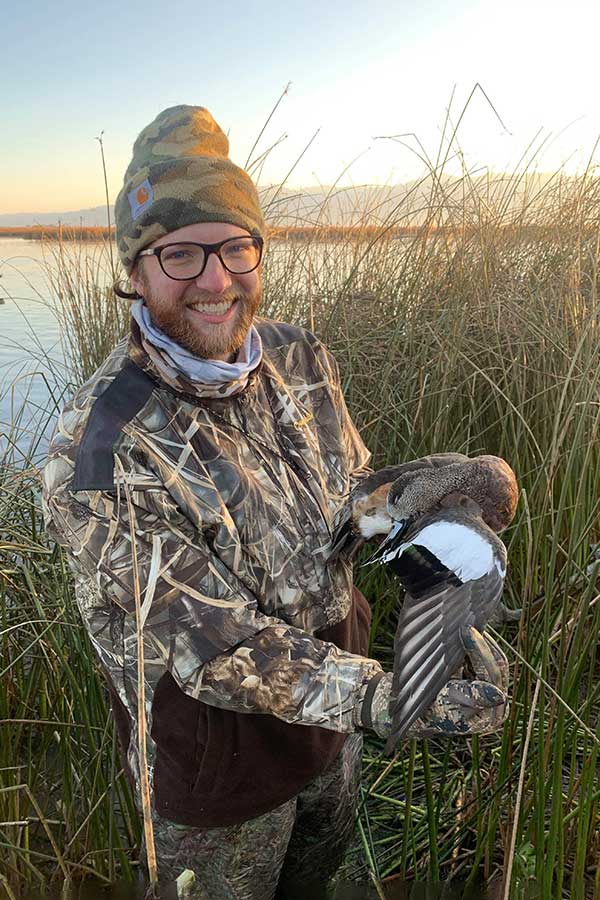
Tom harvested a wigeon and a green-winged teal during his trip. In this photo, he's holding the wigeon.
I also really enjoyed going out with AJ and Austin, my mentors on this hunt. They were both very friendly, encouraging and helpful. They helped me get my first duck, and they were very instructive and took time to answer all my questions. After getting up that early and putting in the work to get the ducks, it felt very rewarding when we were done.
Q3: What were the hardest parts of the hunting trip?
A3: The hardest part was the early-morning drive. I live about 90 minutes from where we met up that morning, so I had to get up really early to meet them out there on time. Other than that, there wasn't anything that felt particularly hard. AJ and Austin have a boat that they were able to take me out on, and they helped me every step of the way.
Q4: Was there anything you were surprised to learn during your hunt?
A4: I learned a lot about ducks and duck hunting, but the thing that surprised me the most was when I was able to see up-close just how vibrant and beautiful the different colors are on the ducks' feathers.
Q5: How did you feel before the hunt started? Did you feel any differently after it was over?
A5: I felt very excited to go out and was nervous that I wasn't going to get anything. After the hunt, I was excited because I had finally had a successful hunting trip. I felt like I could be a successful hunter and was very eager to go out again.
Q6: Members of the Cache Valley chapter of Delta Waterfowl helped mentor you during your hunt. What were your impressions of your hunting mentors and their organization?
A6: AJ and Austin were both very friendly, awesome mentors, and showed genuine interest in helping new hunters (like myself) get into hunting. I was impressed by their willingness to sacrifice time they could have spent hunting to help a new hunter go out.
I was also impressed by how knowledgeable AJ and Austin were and how they were able to answer all of my questions. I have kept in contact with my mentors and am interested in Delta Waterfowl and what they do to help hunters and wildlife.
Q7: You've attended multiple hunting seminars and clinics offered by the Utah Division of Wildlife Resources. Please share your thoughts about those events. Which ones did you attend? Was there a particular event or clinic that got you excited about hunting?
A7: I have attended a How to be Successful at Waterfowl Hunting Seminar at the Eccles Wildlife Education Center (where I met Rachael from the DWR, which led to my participation in the mentored duck hunt), an Upland Game Hunting Seminar at the Lee Kay Public Shooting Range, and a Field Dressing and Game Processing Clinic in Ogden. I enjoyed and learned quite a bit at each of these events.
Some seminars addressed hunting species that I haven't tried hunting yet, so I got some valuable information for possible future hunts. The mentored duck hunt really drove home how valuable having someone to take you out and mentor you can be.
After the Upland Game Hunting Seminar at Lee Kay (before the mentored duck hunt), I tried going on hunting trips for white-tailed ptarmigan, dusky grouse and ruffed grouse, but I haven't had any success with those yet. Thankfully, since I went to the waterfowl hunting seminar before the mentored duck hunting trip, I was able to apply things I learned from the seminar to the hunting trip.
Q8: Do you think you'll continue hunting? If so, which wildlife species do you hope to hunt in the future?
A8: Yes, I definitely hope to continue hunting. I didn’t draw any big game tags last year, but I plan to keep putting in for them. I would also like to keep hunting ducks in the future, as well as try hunting for other waterfowl and upland game species. I’d like to finally get some of the white-tailed ptarmigan and the grouse I’ve been chasing!
Don't miss upcoming hunting seminars and clinics
If you are a beginning hunter and want to attend the same types of how-to-get-started events that Tom did, here are some easy ways you can find out about them and sign up to attend:
- Subscribe to our email list for event reminders
- Follow our events on Eventbrite
- Follow us on Facebook and check the list of events
Hope to see you at one of our events or out in the field!
